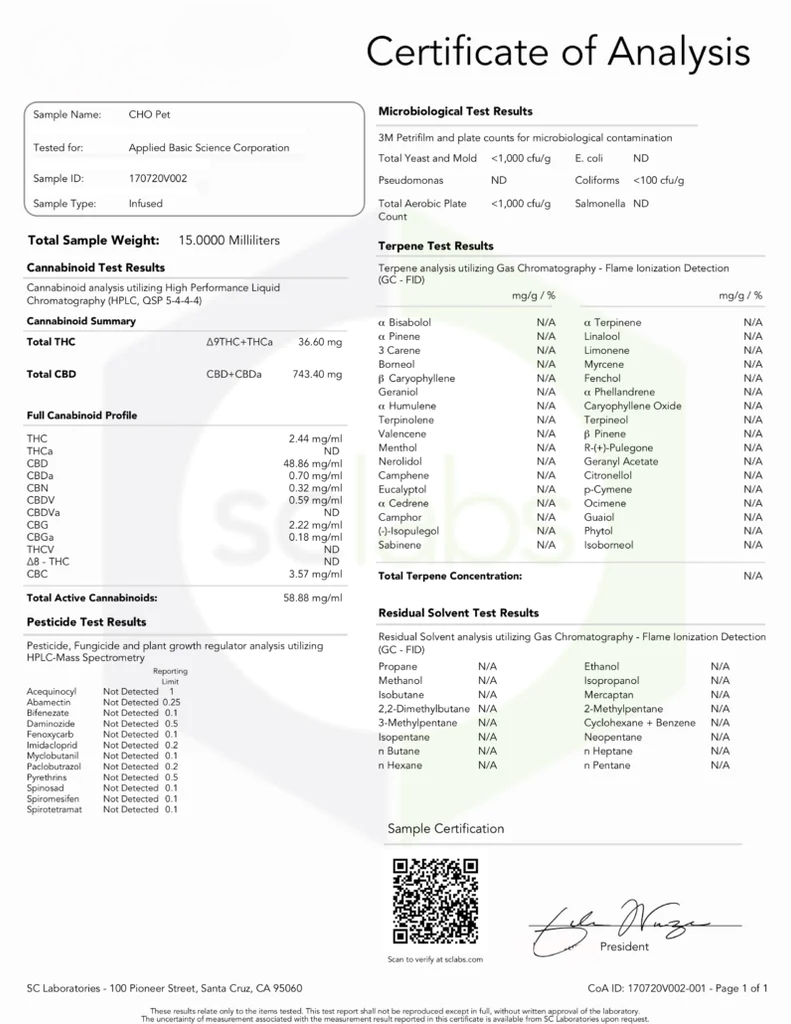Introduction
In the rapidly evolving landscape of prescription cannabis, the necessity for transparency and stringent quality control cannot be overstated. For patients and healthcare providers alike, the assurance of safety, efficacy, and consistency in prescription cannabis products is paramount. This blog delves into the crucial role of providing a full Certificate of Analysis (CoA) for prescription cannabis, highlighting how such measures are fundamental in fostering trust, compliance, and therapeutic effectiveness in the industry.
Ensuring Product Safety and Quality
A Certificate of Analysis is a document issued by quality assurance teams to certify the regulated testing of products, outlining their chemical composition, potency, and the presence of any contaminants. For prescription cannabis, this translates to a guarantee that patients are receiving products that are not only safe but tailored to meet specific therapeutic needs.

Bridging the Trust Gap
In an industry battling scepticism and regulatory hurdles, full disclosure through CoAs plays a pivotal role in building a bridge of trust between manufacturers, patients, and regulators. It reassures all stakeholders of the product’s compliance with legal and health standards, making it a critical tool in the normalization and acceptance of cannabis for medical use.
Regulatory Compliance and Standardization
Transparent practices, including the provision of comprehensive CoAs, are not just ethical but are increasingly becoming a regulatory requirement. They serve as a foundation for standardizing product quality in a market known for its variability, ensuring that all prescription cannabis products adhere to a set benchmark of purity and potency.
Empowering Patients and Healthcare Providers
By supplying a full Certificate of Analysis, manufacturers empower patients and their healthcare providers with the knowledge needed to make informed decisions. This transparency is instrumental in optimizing treatment plans, adjusting dosages, and mitigating potential risks, thereby enhancing the therapeutic outcomes of prescription cannabis.

Cost and Logistical Hurdles
While the benefits are clear, the path to implementing full-scale transparency, including the provision of CoAs, is fraught with challenges. These range from the financial costs associated with rigorous testing to logistical hurdles in maintaining and distributing such detailed reports. However, the investment in overcoming these obstacles is a testament to a manufacturer’s commitment to quality and safety.
Technological Solutions
Leveraging technology can streamline the process of generating and distributing CoAs. Blockchain, for instance, offers a secure and efficient platform for sharing real-time data on product testing, significantly reducing the risk of falsification and ensuring that patients receive accurate information.
Conclusion: A Collective Responsibility
The provision of a full Certificate of Analysis for prescription cannabis is more than a regulatory compliance issue; it is a moral imperative for the prescription cannabis industry. It underlines a collective responsibility towards patients, ensuring they have access to safe, effective, and consistent products. As the industry continues to mature, fostering transparency through CoAs will be crucial in shaping a future where prescription cannabis is fully integrated into healthcare as a reputable and reliable treatment option.

Call to Action
We invite patients, healthcare providers, and industry stakeholders to join the conversation on the importance of transparency in prescription cannabis. Share your thoughts, experiences, and insights on how we can collectively contribute to a more informed, safe, and effective use of prescription cannabis. Together, we can pave the way for a future where every patient has access to the highest quality of care and treatment.







